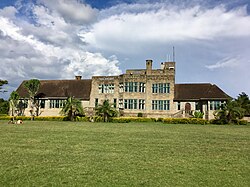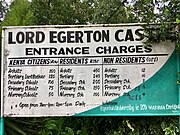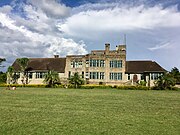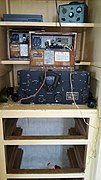| Lord Egerton Castle | |
|---|---|
 | |
 | |
| General information | |
| Status | Completed |
| Type | Castle |
| Architectural style | Colonial |
| Town or city | Nakuru |
| Country | Kenya |
| Coordinates | 0°16′30″S 35°58′20″E / 0.2749°S 35.9722°E / -0.2749; 35.9722 |
| Named for | Maurice Egerton, 4th Baron Egerton |
| Owner | Egerton University |
| Grounds | 100 acres (0.40 km) |
| Website | |
| www | |
Lord Egerton Castle is a house styled like a fortress located 14 km outside Nakuru, Kenya. The foundation was laid in 1938 by Maurice Egerton, 4th Baron Egerton. The architect was Albert Brown. Construction continued until 1954. In 1996 the Castle was declared a monument under Kenyan "The Antiquities and Monuments Act" (Gazetted in April 1996).
The castle was opened to the public in 2005 and is under management from Egerton University.
The castle has 52 rooms, which includes:
- dance hall with electric organ
- dark chamber for developing photos
- entrance hall
- master bedrooms
- study rooms
- wine cellar
Location
Lord Egerton Castle is located off Nakuru- Kisumu highway in Nakuru, Kenya.
Description
The foundation of castle was laid in 1938 by Maurice Egerton, 4th Baron Egerton. It is found in a serene environment with swelling hills and rolling scrubs in the background hence its architecture rises above the landscape. Its construction in 1952 came through a reality that the purpose for which it was built has fizzled out
History
After purchasing the land Maurice Egerton built a small first house. While living in the first house the second house with four bedrooms was built. During this period Lord Egerton was courting a blond English lady by name Victoria and was keen to settle with her. The lady however turned down his proposal on account of what she referred to as a dwelling not befitting of her taste and standard. She would even refer to the house as a “chicken coop”.This prompted Maurice Egerton to construct the imposing castle in 1938 supposedly to impress the lady, who for the second time turned down his marriage offer. With the interruption of the Second World War the construction went on for sixteen years with its completion in 1954. Upon refusing to marry Mr. Egerton, Victoria took off immediately to England. With this humiliation, a distraught and angry Lord Egerton made a monumental resolution: never to engage women in his life and never to marry. No woman was to be allowed into his home for whatever reason. His friends and farm workers were compelled to leave their wives or girl friends at the gate whenever they wanted to see Lord Egerton. In his will Lord Egerton stated that the agricultural college he had founded was to be a male only institution and his wishes were granted for several years until the government of Kenya under pressure of lack of educational facilities directed admission of women into the college and subsequently expanded the institution to present day Egerton University. Intentionally and as per his wishes the authorities retained his name: naming the college and its expansive estate after Egerton. Lord Maurice Egerton stayed in the castle for only four years until his death in 1958 aged 83 years. In his death bed Lord Egerton was attended by a total of eighty medical personnel and care givers largely drawn from Britain. The castle has received legions of visitors who marvel at this vestige of colonial opulence.
Gallery
-
 Lord Egerton Castle (left) with the first house (right) and second house (center)
Lord Egerton Castle (left) with the first house (right) and second house (center)
-
 Lord Egerton Castle fees and opening hours
Lord Egerton Castle fees and opening hours
-
 Lord Egerton Castle front view
Lord Egerton Castle front view
-
 Old telephone from the Lord Egerton era.
Old telephone from the Lord Egerton era.
References
- "Lord's castle of love and hate". The Standard. Retrieved 2018-08-02.
- "Lord Egerton Castle". www.nakuru.co.ke. Retrieved 2018-08-02.
- ^ "Lord Egerton's magnificent castle". Business Daily. 15 May 2014.
- "Lord Egerton's Castle: A Monument to Unrequited Love - Owaahh". Owaahh. 2015-03-17. Retrieved 2018-08-02.
- "A recluse's castle that now hosts thousands of visitors". Daily Nation. Retrieved 2018-08-02.
- "The Kenya Gazette" (PDF). Retrieved 2021-05-25.
- "Egerton University Places of Interest". Retrieved 2021-05-25.
- polly (2020-09-02). "Lord Egerton Castle | Kenya Safari Tourist Destinations". Lake Nakuru National Park. Retrieved 2024-10-04.
- Mutulu, Frank (2014-12-05). "Lord Egerton Castle: A Legacy Of Unrequited Love". AFKTravel. Retrieved 2021-08-30.
- "Lord's castle of love and hate". The Standard. Retrieved 2021-08-30.
- polly (2022-06-20). "Lord Egerton Castle | Lord Egerton | Kenya Safaris Tours | Kenya Tours". Amboseli National Park. Retrieved 2024-10-04.
- "Vision and Mission". Egerton University. Retrieved 2024-10-04.
This article about a Kenyan building or structure related topic is a stub. You can help Misplaced Pages by expanding it. |